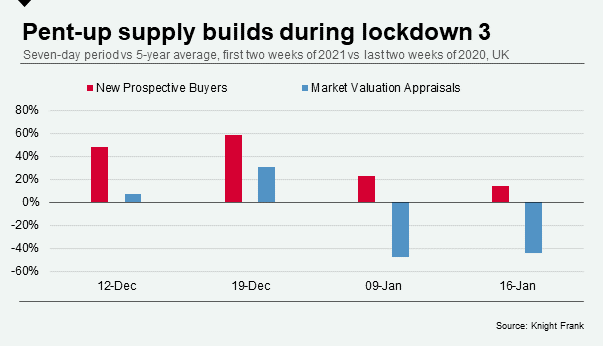Pent-up supply builds amid lockdown 3 uncertainty
The number of new prospective buyers is still growing but fewer sellers could signal a supply spike in the spring
2 minutes to read
If the first two UK lockdowns were marked by pent-up demand in the UK housing market, pent-up supply is becoming a feature of the third.
Data from the first two weeks of this year show that while the number of new prospective buyers remains above the five-year average, market valuation appraisals for prospective sellers are falling.
The number of appraisals fell by more than 40% in the first two weeks of this year compared to increases in the equivalent period before Christmas. The number of new prospective buyers remains more than 10% above the five-year average in 2021 although the figure has fallen slightly since December.
It was one of the reasons Knight Frank recently downgraded its UK forecast for this year. We raised our forecast for the country house market in 2022 as the third lockdown will embed the ‘escape to the country’ trend.

“Mixed messages on the extension of the stamp duty holiday and doubts around new Covid variants mean this is arguably the most uncertain time for the UK housing market of the whole pandemic,” said Tom Bill, head of UK residential research at Knight Frank. “While falling supply and rising demand may actually increase upwards pressure on prices in the short-term, sellers should be aware that this could reverse if large numbers of owners hold off listing until the spring, particularly if the stamp duty holiday has ended.”
While the UK’s vaccination programme is rolling out at speed, there are still doubts surrounding the impact of new more contagious variants of Covid-19. Meanwhile, ahead of the Budget on 3 March, the government is facing pressure from within its own party to extend the stamp duty holiday at a time when economic pressures are mounting and mobility within the labour market will be tested.
“While transaction numbers will undoubtedly fall once the stamp duty holiday ends, comparisons with the period that followed the introduction of the 3% surcharge in April 2016 are wide of the mark,” said Tom. “The uncertain and fluid backdrop means there will be greater scope for prices to be renegotiated and more deals will hold together. Activity is also being driven by reasons that are far more deep-seated than a change in the transaction tax, meaning many buyers and sellers are emotionally invested.”